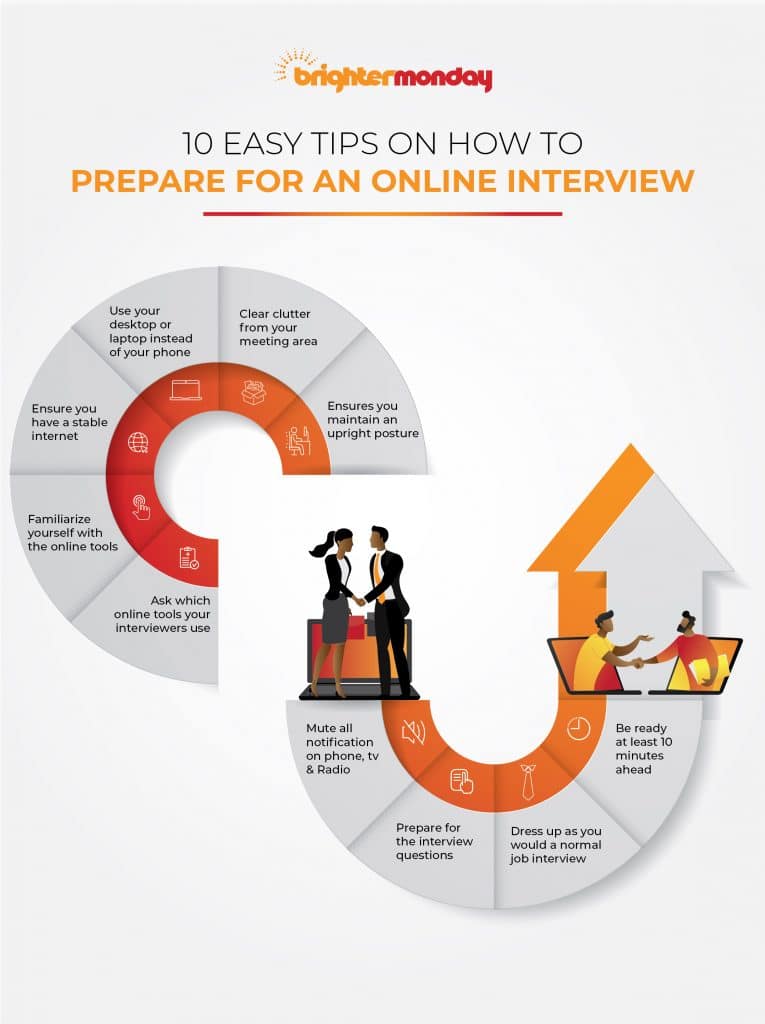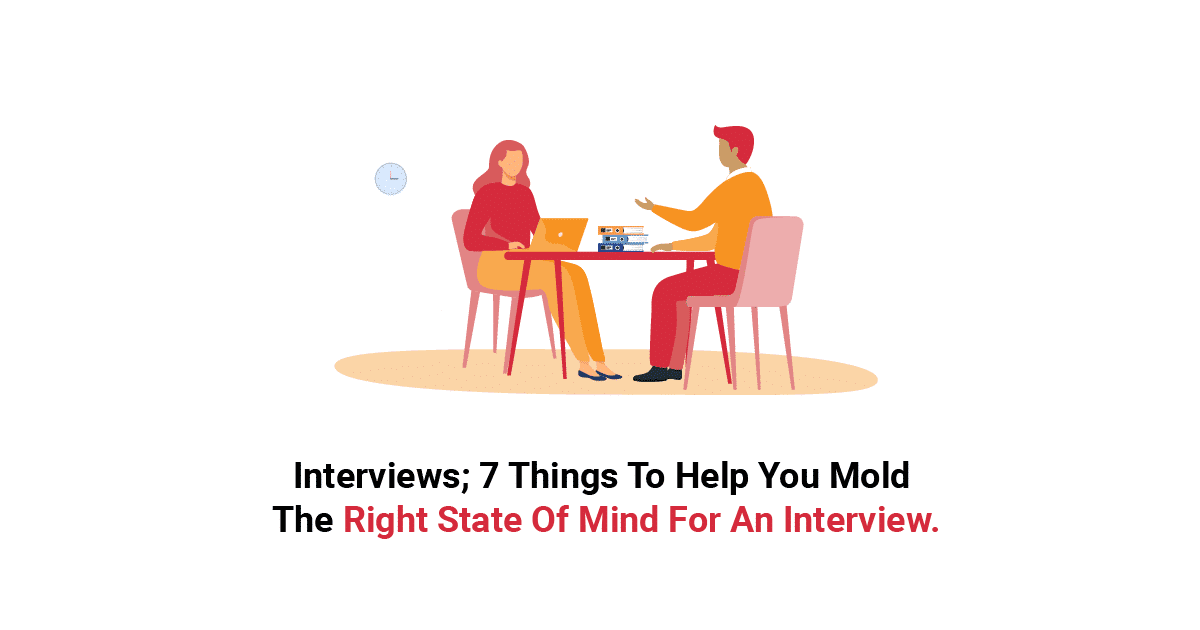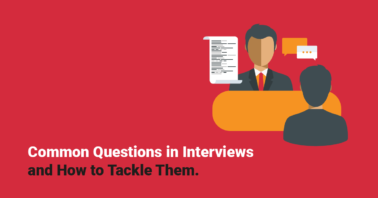Note: It is best to practice these concepts way before you ever attend any interview.
Your state of mind when you are attending an interview can make or break you. At times, you might be very nervous. It is understandable that you might be worried and a little bit afraid of the outcome of the interview. But you know what? You are afraid because of your focus on the negative outcome of the interview.
Quite a number of people have lost their chances of getting a job because they could not handle the pressure of sitting through an interview. In fact, some pretty well qualified people have seen their chances for a job slip by on this count alone. They have the skills, they have the aptitude but they fail in maintaining a great state of mind at the interview.
Assuming that all things are constant:
- You have the desired qualifications that the interview panel is looking for,
- You have the desired references,
- You have the needed experience,
- You have prepared yourself well after school as experts recommend
- You have a great appearance and grooming
- You have a pretty well prepared Resume
Assume also that you are not the only person who meets the above criteria. Assume that there are 50 other candidates who are just like you. What varies therefore falls into the following categories:
- Your Difference in Personality
- Your Difference in the way you tell stories
Without beating about the bush, we can tell you straight up that if you can master the habit of being ‘carefree’, then you get into a heightened state of self-confidence. This greatly influences the chances that you have as compared to the other 50 people. Many people lose their self-confidence because they care too much. Caring too much is not necessarily a bad thing but the problem is that they care too much about not getting the opportunity!
What this does is to effectively paralyze them. Therefore, they lose creativity; they lose their charisma, flair and appear as if they need grace and mercy from the interviewing panel. They appear as if they are needy and only banking (it appears to the panel as if you are begging) on the interviewers to show some great human trait of loving kindness to give you a job.
Grace, Mercy, Loving-kindness on the part of the interviewers is not what will give you a job. Your self-confidence and the ability to showcase your worth, flair and charisma is what will endear you greatly to the interviewing panel. So if you get into this habit of “putting your life in the hands of the interviewing panel”, remember that you are selling yourself short.
Your state of mind, your self-confidence and esteem are factors that determine whether you get the job and if applied appropriately can give one a competitive edge.
They are looking for a self-motivated person, a leader, a go-getter, an influencer, a problem solver and maybe a critical thinker. This means that you have to be sure about yourself. If you are not, at least you have to present yourself as if you are sure about yourself. The only way that you can do this is to get in a great state of being ‘carefree’. Whenever you are in the presence of an interviewing panel, what they need to see is someone who is motivated, inspired, confident, happy, with an aura of certainty about life, not about the outcome of the interview.
The following seven simple principles can be used to improve your state of mind.
- Know that you do not know everything, so do not sweat it: They are also not looking for a genius. They just want someone who can do the job well. So even if you are not able to answer a question correctly, do not anchor your emotion on it. Your anchor for your state of mind should be that it shall be well in your life regardless. So do not sweat it.
- Realize that your life does not necessarily depend on this interview: This is a fact. Before you can go for the interview, you should be fully aware and totally surrendered to the outcome of the interview before you can sit for it. This comes by realizing that one way or another, you are a great person and you will make it in life, with or without this job you are interviewing for.
- Realize that it is OK to fail an interview: And on that note, also realize that what you have failed in is not really a failure, but an opportunity to learn how to do better. So anytime you fail an interview, do not think you have become weak. No! Treat this as a wonderful learning experience. Promise yourself to be better in what you failed the next time.
- Practice detachment: This is the ultimate way of being carefree. To be detached means that you are confident with what you have to present and you do not have to sweat it and spend sleepless nights thinking about the interview
- Practice psychology that generates a great state of mind: Believe it or not, you need to practice how to smile, how to grin, how to wink and a host of all other positive emotions over and over again. Your physiology automatically determines your state of mind. Do not do this principle the night before the interview, but make this a lifestyle. Go ahead and imagine that you are the Manager they are looking for and start modeling how a manager behaves. This will attract that position to you.
- Be an inverse paranoid: Have this belief that all things are working and conspiring together for your good. All the good, the bad and the ugly. Regardless of the outcome of the interview, you should believe that your life will still be okay.
- Practice to ask yourself better questions: Questions create focus instantly. Ask yourself questions such as: Suppose I succeed? How can I be a great help to this company? Why are these people finding me so inspired and cut out for this position? Ask these types of questions and shun the negative ones such as: Will I really get this job? Will they like my new suit? And so on.
What attracts positive or negative outcomes in our lives is also a result of the State of Mind we are in. The thing with State of mind is that you can consciously practice to put yourself in a better State of Mind at all times. When many people are attending interviews, they are never at their best state of mind. They are nervous wrecks. They are worrisome. They are in an inferior state of mind. They present themselves as a lamb ready for slaughter in a slaughter house. They are not in control. They cede control of their emotions to this moment. A host of them are allowing a hoard of negative emotions to calibrate their thoughts and feelings.
The outcome is normally lack of confidence from the people interviewing them. However, once in awhile when an interviewing panel finds someone whose skill set are good and at the same time they do have great confidence, great attitude and most importantly a great sense of self assurance and carefree attitude, they are a special blend for hire. They are emotionally intelligent.
The good news is that you can practice having an amazing positive state of mind for a period of time before you attend an interview. Please also note that this healthy state of mind is not just for you to pass an interview, but it is a great tool to use throughout your life.
Table of Contents
Interviews: Types of Interviews and how to Nail them
Understanding interview dynamics, planning properly is not just important, but crucial as first impressions are bound to last. Understanding that even bidding for a job as a self-employed person is still doing an interview of sorts, requires that you know how to go about it. So having a set mind frame prepares you best as you think about getting ready for a job interview.
Preparation is prime! An interview isn’t an adrenaline rush adventure after all. Whenever getting ready for job interviews, prepare you situation action result (SAR) stories. Assume that everyone has copied and pasted a couple of generic skills and strengths onto their CV and so interviewers are not keen on listening to you re-echo these lies. Knowing these stories by heart and remembering to always answer an interview question with an SAR, not just a grocery of skill will set you apart from the rest of those being interviewed. Interviewers will understand your contribution to assignments and what sets you apart from other people.
So what are the different interviews you are most likely going to come across in your job search process?
Behavior based interviews
This is the most common type of interview. It is based on the premise that your past behavior is going to be a foundation and performance level for you future. Behavior based interviews are usually an hour long. Therefore using SARs is important and each story should be between 3-5 minutes and not more. The use of eye contact to the interviewer or interviewers will be a plus during the interview. Most Government interviews are behavior based interviews.
Phone Interviews
These can be out of the blue and might catch you with your pants down. However thank God for a caller ID that helps compose oneself. The purpose of the interview is to see whether one might consider a face to face interview, so they must be treated seriously. Impression is key in this instance because the call is never long. But that doesn’t mean all phone interviews are for a face to face meet. Some are part of the interview for the candidate and could lead to failure in cases where you put a language on your application, and this interview will be taken in that language. Availability and flexibility is also looked out for by the interviewer, therefore picking up calls from strange numbers might become a must as you await the interview.
Structured interviews
These are face to face interviews. The candidate will be probed and probed and probed some more. The interviewers in this case are looking for dedication, teamwork, leadership and personal characteristics. In this case, thinking before answering is a good skill set. Asking questions where the question isn’t understood and using SAR stories will be needed during the interview.
Case Based interviews
These interviews are for higher ranked professionals. The interviewer presents a business case and the candidate has to solve the problem. This tests the candidate’s technical knowledge and skills, problem solving, strategic thinking, leadership skills and the ability to perform under pressure. Sometimes if the candidate has not been in a job set like this before, prior knowledge of the company and its dealings help plan better for the interview.
Situation interviews
These types of interviews, the candidate is asked about certain situations and scenarios. Unlike case based interviews with one specific outcome, this type of interview has more than one outcome and therefore any answer is probably a test and follow up questions can be developed along the answering pattern. Skill set and personality must come through during this type of interview.
Stress interviews
These types of interviews are few and far between. These are interviews for senior executive positions and the candidate will always be put on the spot. However some junior positions that deal in stress related environments positions, this technique can be used. This will test how well the candidate can handle oneself under stress. This might cause the candidate to feel threatened or ticked off. The need to arouse emotion will be used as a form of technique and thus a higher level of calmness is needed to bring out the different attributes like creativity, organizational skills, thinking on the spot and attitude. A question like ‘what do you think is wrong with the organization’, can be presented.
Second and Third interviews
Do not assume prior knowledge of the candidate after the first and second interview. These interviews are used to collect more information about the candidate. Be sure to ask each interviewer what the important responsibilities and challenges of the job are and what their management style is. As the interview progresses, you might be required to give more input into what actions you might take on the job in the next 30, 60 or 90 days. Please remember this doesn’t mean you have acquired the job, but you are one step closer to attaining as a preferred candidate.
Meal Interviews
Eating in front of a stranger who could potentially be your boss could be unnerving. Ordering moderately priced meals and using dining etiquette is necessary to impress in this situation. Dinning etiquette like not speaking with your mouth full, not slurping and using the right cutlery is necessary. Of course alcohol is a no even when presented to the candidate. For foods options, a recommendation from the interviewer or waiter might help in cases where lack of knowledge of food types is eminent.
Information is always key when going into an interview. Ultimate success is being organized and prepared for whatever is coming your way. Dressing appropriately, but also carrying a positive attitude and smile are good for each candidate.
Non-Verbal Interview Mistakes In Job Interviews
Preparing for an interview is important. Researching the company and knowing exactly what to answer when asked the common interview questions is only half the battle. Most recruiters understand that job seekers are getting better at preparing for job interviews. Therefore, they have also learnt to go the extra mile in picking the right candidate in a competitive job market through focusing on the non-verbal interview mistakes portrayed by candidates. Most job seekers are aware of the common interview tips and do their best to stand out from the rest of the applicants. However, most common interview mistakes are made without actual verbal communication between the hiring manager and interviewee. Here are the common non-verbal interview mistakes to avoid:
Poor Posture

How a candidate sits during an interview says a lot about them as an individual. A slouching position shows lack of interest in the interview process while an inwardly forward position shows lack of boundaries. Sit upright during the interview process to avoid any misconception. Do not cross your arms across your chest either, this shows that you are not open to new ideas and draws you away from the interviewer.
Dress Code
This is a common interview mistake that most job seekers do not understand yet. A recruiter reads how you dress and act as you walk through the door. Research about the company and understand the company culture before showing up. This shows interest and lets the interviewer know that you are ready to blend into their teams to promote the company objectives.
Lack of Facial Expressions
Smile. The interviewer needs to feel that you are interested in the conversation and are willing to communicate your feelings. It also shows you are confident in your abilities and enthusiastic about the position you seek to attain. When you extend a handshake, be firm enough to show confidence in yourself.

Expansive Hand Gestures
Showing your confidence is important, especially when you are trying to explain an achievement you are proud of to the interviewer. However, learn to limit how much you extend your hands in a bid to express yourself. Imagine accidentally knocking over something during the interview process, making the remaining time uncomfortable for both parties.

Fidgeting
Nervousness is a common thing when it comes to interviews. Everyone gets nervous at some point in their life. However, how someone handles the situation portrays a lot about them and how they handle situations. Touching your hair, tapping your feet, biting lips or moving in your chair every 5 seconds can be major non-verbal interview mistakes. It’s important to try and stay composed.
Body language is very important. Job seekers must understand that everything counts in an interview, and just knowing how the company operates is not enough to successfully go past an interview. You can be the most eloquent person for the job, but if your body language portrays you differently, you have no chance to get past the interviewing panel. To increase chances of success, job seekers must understand these non-verbal interview mistakes and learn to avoid them.
How to Prepare for an Online Interview
If you have been lucky to have an interview over the last few weeks, or have one coming up, it is most likely an online interview. The world took an unprecedented turn over the last few months, affecting both our personal and professional lives. With improved technology, it has been easier to navigate through the current Covid-19 crisis. Companies are slowly adopting the available technology to keep their operations running and using tools like Zoom, Skype and Google hangouts to hold meetings and interviews. It has also opened up an avenue for both employers and employees to work from home. Here are tips on how to prepare for an online interview.













